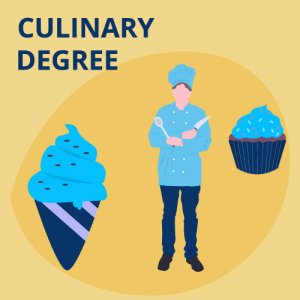What Kind of Accreditation Should My Degree Program Have?
To be sure that future employers will be interested in your degree, it is important to know that your school has the appropriate accreditation.
For any higher education discipline, particularly for the Culinary Arts, accreditation is crucial when choosing an institution.
The college or university is eligible for financial support if the Department of Education has recognized an association that provided the accreditation.
First of all, accreditation shows that an educational institution adheres to the standards.
Secondly, the program is relevant and continues to expand in its field.
There are institutional and programmatic accreditation processes.
One is required for schools, the other for a specific discipline and degree program.
Regional Accrediting Agencies
Regional and national accreditation agencies can provide institutional accreditation.
In short, regional accreditation agencies enhance reputation and credibility.
When studying the conditions of colleges and universities, it is advisable to obtain a “stamp of approval” from one of these accreditation agencies depending on the region:
- The Higher Learning Commission
- Middle States Commission on Higher Education
- New England Association of Schools and Colleges
- Northwest Commission on Colleges and Universities
- Southern Association of Colleges and Schools Commission on Colleges
- Western Association of Schools and Colleges
If you plan to obtain any degree of associate, bachelor’s or master’s degree in cooking, check whether your school is accredited by one of these 6 associations.
Programmatic Accrediting Agencies
A degree in culinary arts provides practical skills and diploma/certification programs in this field are very credible.
Therefore, non-accredited institutions often issue such certificates.
That is, national accreditation is very important for culinary programs.
The American Culinary Federation (ACF) ensures the quality of food and methods of its preparation, the safety of cooks, bakers, and teachers of cooking in the field.
Many diploma programs also receive press approval from the ACF.
Although, if you receive a bachelor’s or master’s degree, regional accreditation is sufficient.
Azov certification is a reliable indicator of the quality of programs when choosing a culinary program from a variety of available options.
To determine accreditation status, you simply need to contact the chosen school.
Chiefly, the database of the Department of Education contains all accredited companies within its competence.
If you know about accreditation, you can consider several options for obtaining a degree.
What Kinds of Culinary Arts Degrees Are There?
Diploma/Certification in Culinary Arts
Getting a diploma or certificate in culinary arts is a good way to get to know this field better.
The diploma program will provide you with basic kitchen skills such as working with kitchen appliances ways of handling food processing and food safety.
In addition, a credential will allow you to find work in many kitchens.
When looking for diploma or certification programs in the culinary arts, make sure they have a good reputation and that the curriculum is of good quality.
An example of this would be a program accredited by the American Culinary Federation (ACF).
A certificate allows you to work as an entry-level cook or food service professional.
You can work in a variety of conditions as a chef, restaurateur or kitchen manager.
Or you can continue your studies at the Master’s level for this purpose.
What’s more, it’s the fastest way to get a full-time job in your field.
What Courses Will You Take?
- Culinary Fundamentals
- Introduction to Meat, Fish, and Poultry
- Soups and Sauces
- Moist-Heat Cooking Methods
- Dry-Heat Cooking Methods
- Breakfast, Brunch, and Lunch
- Culinary Arts
- Pastry & Baking Arts
- Restaurant & Culinary Management
- Hospitality Management
- The Techniques of Artisan Bread Baking
- The Art of Cake Decorating
Associate Degree in Culinary Arts
Your associate degree can expand your opportunities and be a great way to start your catering career.
Together with a respectable diploma, you will get practical initial skills for working in different institutions.
In addition to restaurants and cafes, you can work in the kitchens of school hospitals and so on.
This program requires 60-70 credit points and takes two years.
In time, she will provide you with the necessary knowledge in the field of beverage confectionery, cooking, and safety.
You will also have access to basic business and management knowledge of food services.
This way, an associate degree from an accredited program will give you the skills and tools that will help you get started with cooking or distributing food.
But that’s not all because you can get a bachelor’s degree.
What Courses Will You Take?
- Food Safety
- Culinary Math
- Intro to Gastronomy
- Seafood Identification and Fabrication
- Baking and Pastry Skill Development
- Intro to Hospitality and Customer Service
- Wine Studies
- Formal Restaurant Cooking
Bachelor in Culinary Arts
It is not necessary to have a bachelor’s degree to work in the kitchen.
However, if you plan to be a manager of the kitchen or of the entire institution, it is mandatory.
After completing the Associate Program, you can choose a particular direction.
A four-year 120 bachelor’s credit program will introduce you to food, desserts, beverages, safety instructions to get to your direction.
Depending on local culinary traditions around the world, bachelors can concentrate on literally anything – cakes, wine, seafood.
A bachelor’s degree will help you on your way to leadership in this area.
Moreover, students of the culinary arts department have a chance to get a double secondary or higher education in business or organizational leadership.
This is useful for the career of a restaurateur, chef or manager in a food services direction.
What Courses Will You Take?
- Methods of Cooking
- Breakfast Production
- Storeroom Operations and Purchasing
- Cost Control
- Human Nutrition
- Fine Dining Service
- Menu to Plate Concepts
- Global Flavors
Master in Culinary Arts
A master’s degree in culinary arts is required for those who want to take a leading role in this field.
If your destination goes beyond the kitchen walls, you can qualify as a chef to manage your kitchen and a successful restaurant.
If you do not limit yourself you can cook dishes from different parts of the world while studying abroad.
Also, masters of culinary arts are suitable for those who are interested in organizational leadership in the field of public catering, corporate restaurants, hotel management.
Usually, such 30-60 credit programs last 1-2 years.
Of course, a Master’s degree will be your competitive advantage in your career progression.
What Courses Will You Take?
- Sanitation and Safety
- Traditional Techniques
- Baking and Pastry and Theory
- Pastry Techniques and Artistry
- Classical Techniques
- Latin Cuisine
- World Cuisines
- Beverage Operations Management
What Kind of Licensing or Certification Do You Need?
To become a certified chef, you must pass a special exam administered by the American Culinary Federation (ACF).
In addition, the leading association for the culinary accreditation program certifies master cooks, chefs and other professionals in the field.
To have an opportunity to pass the ACF exam, you need to have a basic two-year diploma in culinary arts or at least two years of work experience in the kitchen.
If you are interested in growing up as a kitchen chef then you need the ACF certification first.
Depending on your referral and employment, you may need other types of certification.
For example, working in the kitchen itself requires a foodservice operator’s license or equivalent, depending on your area of expertise.
Your job and position may require other certifications.
For foodservice businessmen, a food safety license may be required, a public catering license, an alcoholic beverage license or another business permit.
These requirements depend on your position and responsibilities and the state where you are located.
Before starting a certification or licensing program, make sure it is recognized by an authoritative association or group
Most often, you will need to complete an educational course or training to get a certificate.
Popular Degree Programs
What Can You Do With This Degree?
With a diploma or certificate in the field of culinary arts, you will have access to the hotel catering sector as an employee in one of these popular positions:
- Food Service Manager
- Bartenders
- Chefs and Head Cooks
How Much Can You Make With This Degree?
According to the Bureau of Labor Statistics, in 2019 employers offer the following basic wages for the best jobs in the food services, preparation, and hospitality market:
- Waiter/Waitress — Mean annual wage of $21,780
- Bartender— Mean annual wage of $22,550
- Food Preparation Worker — Mean annual wage of $23,730
- Baker — Mean annual wage of $26,520
- Chef and Head Cook — Mean annual wage of $48,460
- Food Service Manager — Mean annual wage of $54,240
- Nutritionist — Mean annual wage of $60,370
What Professional Associations or Societies Should You Join?
The best way to establish new connections in your field is to join a professional association.
Here you can also learn about useful seminars or contests and improve your personal knowledge.
Obviously, your chosen career path will determine which associations you decide to join.
Find out about Culinary Artsassociations that match your professional direction:
International Association of Culinary Professionals
The community is founded by specialists including Jacques Pepin Anne Willan and Julia Child.
Members may come from a variety of professions, such as bloggers, chefs, photographers, craftsmen, restaurateurs, food producers, and others.
This provides an opportunity to learn how to cooperate and establish contacts.
American Culinary Federation
The American Culinary Federation has been in operation since 1929.
Its mission is to improve the professional reputation of chefs with different educational levels around the world.
The American Institute of Food and Wine
It is a professional, non-profit organization that has been operating since 1981 thanks to Richard Graff, Robert Mondavi, and Julia Child.
Here sommeliers and chefs can attend social and educational events for trade or promotion.
James Beard Foundation is an organization named after the late James Beardtrains professional cooks and awards them with scholarships, training, publications.
National Restaurant Association is one of the largest foodservice associations in the world.
The Association operates to support restaurant managers and owners in a variety of activities.
North American Sommelier Association is an organization focused on wine professionals that provides training and incentives for its members.
Summary
Now you have a more particular vision of your culinary career.
Choose your own path and start applying your talents in work.
The degree in Culinary Arts allows you to choose one or more interesting directions.
It’s a great opportunity to realize your culinary talent and save humanity from hunger.
See More Degrees
What can you do with a degree in...







